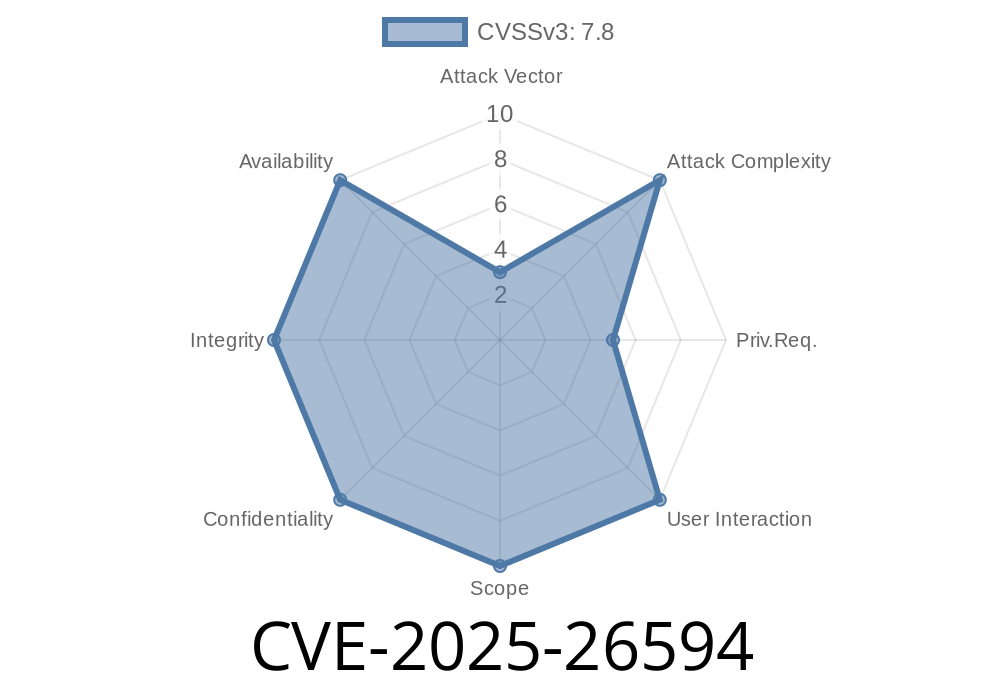X.Org and Xwayland are at the heart of graphical desktops on Linux and Unix systems. On February 21, 2025, security researchers disclosed a critical use-after-free vulnerability, tracked as CVE-2025-26594, which can potentially allow attackers to crash the X server or run arbitrary code. In this post, we’ll break down how this flaw works, why it’s dangerous, and show a simplified code flow that can trigger this vulnerability.
Understanding the Vulnerability
In X.Org and Xwayland, the "root cursor" refers to the mouse cursor image shown over the desktop background. Internally, the X server keeps a global pointer to the cursor currently used by the root window.
The X server keeps a reference to the cursor object as a global variable.
- If any client frees (destroys) that cursor while it’s still being referenced, X.Org's global pointer ends up pointing to memory that’s been already freed.
- The next operation using that global pointer causes a use-after-free, leading to a crash — or even code execution if an attacker has carefully crafted memory allocations.
Here's a simplified C-like pseudocode example reflecting what was happening internally
// Global reference to the current root cursor
CursorPtr rootCursor;
// When setting the root cursor
void SetRootCursor(CursorPtr cursor) {
rootCursor = cursor;
}
// A client can free any cursor they created or used
void FreeCursor(CursorPtr cursor) {
free(cursor); // <-- cursor is now invalid!
// rootCursor might now point to freed memory.
}
// Later, the X server tries to use rootCursor
void ShowRootCursor() {
DrawCursor(rootCursor); // <-- BOOM: use-after-free!
}
If a malicious client calls FreeCursor(rootCursor), the X server’s next use of rootCursor — for drawing, event handling, or anything else — now dereferences freed memory.
Freeing that cursor from their client session (while still in use as the root).
3. Triggering X server behavior (such as moving the mouse, switching workspaces, etc.) that uses the root cursor, causing the X server to crash (segmentation fault) or, with effort, executing malicious code.
Proof-of-concept in X protocol pseudocode
# Python+Xlib pseudocode
from Xlib import display, X
d = display.Display()
root = d.screen().root
# 1. Create a new cursor
cursor_font = d.open_font('cursor')
cursor = d.create_glyph_cursor(cursor_font, ...)
# 2. Set it as the root cursor
root.change_attributes(cursor=cursor)
# 3. Free the root cursor while it's still in use
d.free_cursor(cursor)
# 4. Move mouse/trigger redraw, X server now uses freed memory (potential crash)
This works because the server keeps a reference after the client says "free this."
Why Is This Dangerous?
- Denial of Service: Any local user could crash the desktop environment by exploiting this bug, knocking out all GUI sessions.
- Potential Code Execution: Use-after-free can sometimes (with skilled exploitation and memory spraying) lead to attackers executing arbitrary code. On workstations, this could mean escalating privileges or persistent malware.
- Attack Surface: Any client with access to the X server (often anyone with a logged-in session) could trigger this bug.
- All unpatched X.Org and Xwayland servers, particularly on Linux distributions prior to
- X.Org Server fix commit
- Xwayland fix
- Systems running "startx", "xinit", graphical login managers (gdm, sddm, lightdm, etc.) where multiple users may interact or where untrusted apps run.
Mitigation
- Patch Now: Upgrade X.Org/Xwayland to versions released after February 22, 2025.
Restrict X access: Limit who and what can connect to the X server.
- Consider migration: Migrate to compositors (like pure Wayland) that isolate clients better than X.
References
- CVE-2025-26594 on X.Org security page
- Freedesktop.org Bug report #1543
- Official patch and commit log
- X.Org Twitter/X Announcement
Final Thoughts
While X.Org is mature, it’s old and can have legacy issues like this. CVE-2025-26594 is a powerful reminder: Local threats matter on desktop systems, and tight resource management is critical. If you’re an admin, upgrade your X server packages immediately — and plan for a safer desktop future.
*If you found this helpful, share with your team or distro maintainers. Stay safe!*
Timeline
Published on: 02/25/2025 16:15:38 UTC
Last modified on: 03/17/2025 05:15:34 UTC
